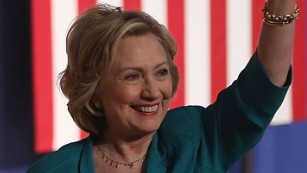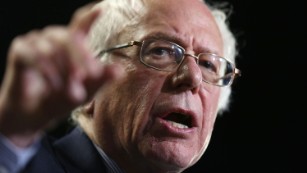Hillary Clinton is itching to take on Donald Trump in a one-on-one contest for the White House — but she isn’t pushing Bernie Sanders off the stage yet.

Democrats close to Clinton and the man who could become a top surrogate — President Barack Obama — insist they won’t pressure the Vermont senator to leave. That reluctance is based on fear inside the Democratic establishment that such a move would make it more difficult to unite the party later this year.
Clinton needs the excited supporters that have rallied around Sanders and hopes treating the senator’s campaign respectfully will make them more likely to back her against Trump. Clinton has already started to make overtures to Sanders’ supporters — pledging to support them even if they don’t support her — and campaign aides have said those will continue in the coming weeks.
Clinton on Wednesday told CNN’s Anderson Cooper said she isn’t pushing Sanders to hurry up.
“I’m not calling myself that (the presumptive nominee),” Clinton said. “I know there are some contests ahead and I respect Sen. Sanders and whatever choices he’s making. And I have a lot of empathy about this, Anderson. You know, I ran to the very end in 2008.”
Obama’s White House agrees there’s no rush.
“The key here is unifying the party,” said one Democrat familiar with the White House’s thinking. “So with that in mind, we are being careful to let the process play through and provide the space for there to be a unifying moment for Hillary Clinton and Bernie Sanders.”

The Democratic contest may march on but the party’s infrastructure is already preparing for a Clinton nomination and the former secretary of state is starting to put general election plans into place. While Sanders will continue to campaign across the country — including planned stops in West Virginia on Thursday — pledging to fight until the convention, Clinton’s aides said this week that she will pursue a two-prong strategy for the coming weeks: Campaign in every upcoming primary while also making trips to general election battleground states.
That strategy, though, has not quelled the nerves of Democrats across the country, who are worried that without any GOP rivals, Trump will now turn his entire focus to Clinton, possibly defining her early and hurting efforts to rehabilitate her already dinged image.
After Trump all but locked up the nomination on Tuesday night, Clinton surrogates and supporters asked the campaign’s top aides whether they can use their TV and online platforms to start asking for the Vermont senator to get out of the way.
The answer they got back was a resounding no.
“The campaign won’t give us the green light to tee off on him,” said one supporter who asked. “It was all good to say ‘Bernie should stay in’ when Trump was running against other people but now that she has to take on his attacks and Trump’s attacks, things have changed.”
The supporter added, “To Secretary Clinton’s credit, she won’t let anybody start pushing him out.”
Obama isn’t jumping in yet
The Democratic figure who could provide her campaign a unifying boost — Obama — remains on the sidelines of his own party’s contest.
The White House on Wednesday wasn’t offering any major shifts in its strategy to elect another Democrat to the Oval Office, aside from predicting that Obama’s now-regular attacks on Trump would only ramp up.
Obama has taken to dinging Trump on an almost weekly basis, even as his administration begins preparing for the intelligence and defense briefings to which all nominees are entitled.
The latest example came Monday, when Obama told WMUR that Trump wasn’t “equipped to deal with the problems of this office.” Aides say he enjoys those opportunities, even if he outwardly seems dismissive of the political circus.
For Obama, ensuring the Democratic Party emerges from its nominating process intact has meant saying or doing little that would appear to favor Clinton, even as it remains obvious he sees his former secretary of state as a more predictable caretaker of his legacy.
The coalition that helped bring Obama into office has largely split between the two Democratic candidates: young people for Sanders, minorities for Clinton, and college-educated whites divided between the two. Even Obama has acknowledged that convincing those groups to vote could pose a challenge.
Democratic officials say Obama will likely target those audiences when he eventually does hit the campaign trail later this year. Without revealing any firm plans, they say stops on college campuses are likely, as are visits to swing states where his presence could boost turnout, like North Carolina and Nevada.
“There is no denying the President will have an active role in the general election,” White House press secretary Josh Earnest told reporters aboard Air Force One Wednesday. “There are six months until Election Day. I’m confident the President will spend many of those days between now and Election Day making a strong case about the progress our country has made over the last eight years.”
Campaign trail
Vice President Joe Biden, meanwhile, will reprise the role he’s played in past contests, campaigning in places where his connection to working-class voters could provide a lift to a Democratic candidate. One official identified Pennsylvania, Ohio, and Michigan as likely stops for the Vice President in the general election.
Both Obama and Biden have endorsed Democratic Senate candidates, and will likely continue eyeing down-ballot races. The President also remains a draw for deep-pocketed Democratic donors, and his fundraising schedule will continue apace in the coming months.
With entire chapters of his presidential legacy riding on who succeeds him, no one has more stake in the party coming together than Obama. And as the Democrat that both Clinton and Sanders supporters can love, he stands the best shot at keeping the warring factions from inflicting mortal wounds.
To that end, Democratic officials aligned with Obama say they’re closely watching Sanders’ tone as the race moves toward its final stages. But there’s zero effort to push the Vermont senator from the race — either explicitly or behind the scenes.
The Clinton campaign has so far been effective at stopping high level surrogates and supporters from telling Sanders to get out of the way, and the White House has helped in the effort.
Proof of that success: Even Priorities USA, the pro-Clinton super PAC that will spend millions to hit Trump and defend Clinton in the general, said Wednesday that they will not call on Sanders to get out.
“Since the results in Arizona, our focus has been solely on the general election and preparing for the general election,” said Justin Barasky, the super PAC’s spokesman. “Nothing that happens in the coming weeks will change our focus from stopping Donald Trump. We expect Hillary to be the nominee.”
As reported by CNN
